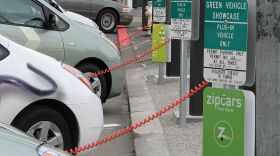The recently released 2013 Clean Tech Leadership Index published by Clean Edge Incorporated, has ranked Massachusetts second behind only California in an overall ranking that scores states on measures to promote energy efficiency, industry policy, technology development and capital investment.
New York also made the top 10 and was ranked 4th.
Massachusetts Department of Energy Resources Commissioner Mark Sylvia said that much of the progress recognized by the report can be attributed to policy enacted in Massachusetts including the Global Warming Solutions Act and the Green Communities program, both started in 2008 and promote energy efficiency.
Sylvia said that the state has also been rated the number one state in energy efficiency for the past two years by the American Council for an Energy Efficiency Economy and that the rankings have caused other states pursuing clean energy goals to look to Massachusetts’ programs as an example.
Under the policy category, Massachusetts was ranked 1st in the nation. The category measures climate change policy, transportation, building codes, and the renewable portfolio standard. New York ranked 3rd and Connecticut ranked 10th.
The commonwealth was also ranked 1st in the capital category, which focuses on venture capital investment and research. New York ranked 4th, and Vermont 7th.
Alicia Barton, President and CEO of the Massachusetts Clean Energy Center, a quasi-public agency that works to promote economic development through renewable energy, highlighted strategies including the pilot InnovateMass program, which through private partnerships, provides funds to startup clean energy businesses.
Barton also said programs like Solarize Massachusetts, a solar energy group-buy program for specific communities, helped the state set a new target for installed solar this year, after the state reached its 250 MW goal four years early in May. The new target is 1,600 MW by 2020.
Barton said the policies and programs have helped create thousands of jobs for clean energy companies, technicians, auditors, and others.
Commissioner Sylvia said the state’s success in developing new technology to save costs and reduce greenhouse gases will continue.





